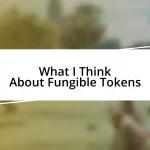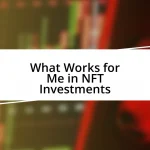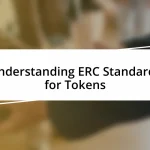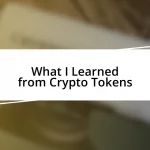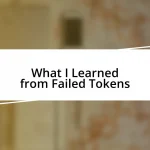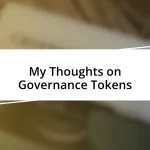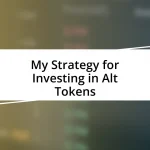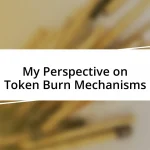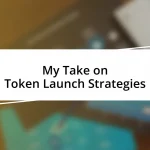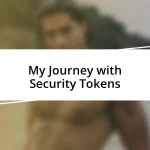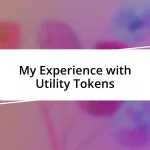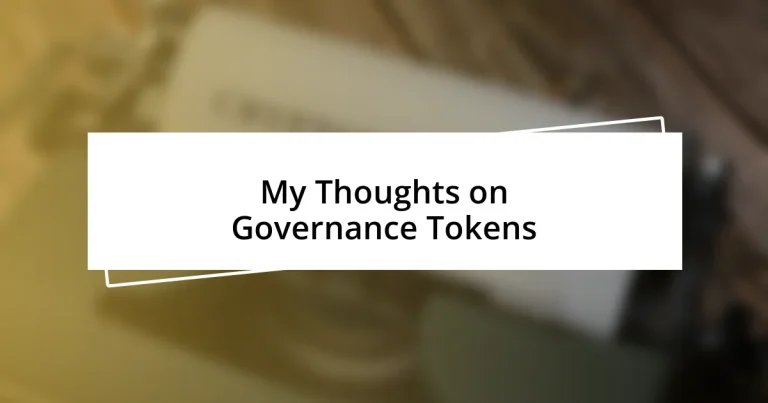Key takeaways:
- Governance tokens empower holders to actively participate in decision-making, promoting a sense of ownership and engagement within decentralized communities.
- Challenges include the risk of centralization, complexity of proposals, and voter apathy, which can hinder broader participation in governance processes.
- The future of governance tokens may lead to more equitable governance structures and greater integration within decentralized finance ecosystems, requiring careful navigation of regulatory landscapes.
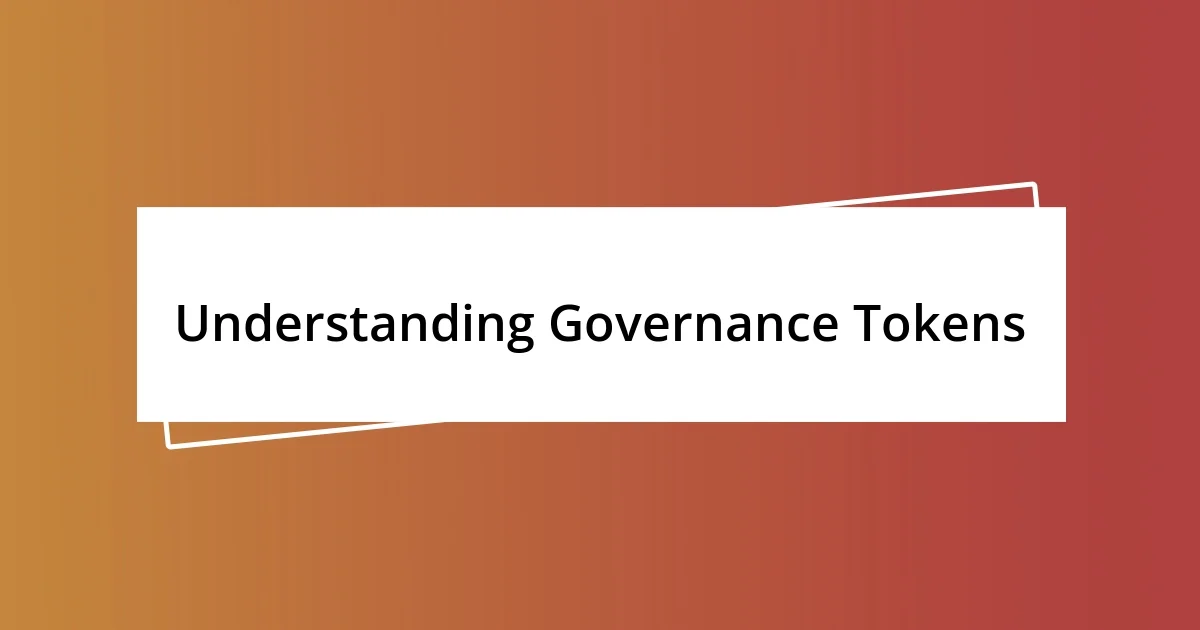
Understanding Governance Tokens
Governance tokens are fascinating tools that empower holders to dictate the future of decentralized organizations. Imagine being part of a community where your voice truly matters—these tokens allow you to vote on proposals and influence decisions, much like shareholders in a traditional company. Have you ever wished for a seat at the table in discussions that affect you? With governance tokens, you can have just that.
When I first learned about governance tokens, I felt a rush of excitement. It was like discovering a new avenue for activism in the digital world. Each token represents not just value, but the power to shape projects and steer development paths. This democratization is significant, especially in a space often dominated by a few powerful players. Have you considered how your opinions could impact a project you’re passionate about?
In my experience, engaging with governance tokens has transformed how I interact with blockchain projects. They are more than just financial assets; they represent an opportunity to contribute to the direction and priorities of a community. I found myself not only investing my money but also my time in understanding the nuances of what each proposal meant for the project’s future. It’s a unique blend of economic and social engagement that can feel incredibly rewarding.
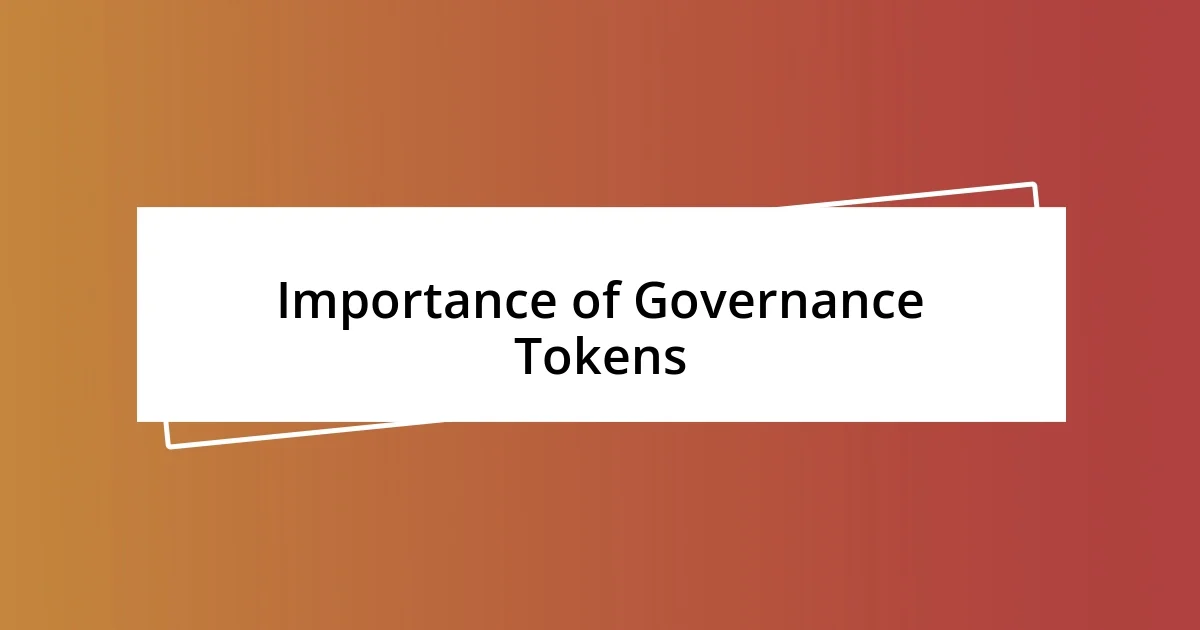
Importance of Governance Tokens
Governance tokens are crucial for cultivating a sense of ownership and accountability within decentralized platforms. When holders vote on proposals, they aren’t merely participating in a transaction; they’re actively shaping the community’s future. I recall a particular instance when a proposal I backed was passed, and it felt exhilarating to know my vote truly impacted the project.
What’s fascinating is the way governance tokens foster transparency. Unlike traditional corporate boardrooms, where decisions are often made behind closed doors, the decentralized approach invites everyone to weigh in. I remember the first time I participated in a voting session—there was an electric sense of possibility that the outcomes reflected our collective will and not just the whims of a few decision-makers.
These tokens also encourage deeper engagement. I’ve noticed that when people hold governance tokens, they tend to become more invested in the project’s success. It’s not just about the potential financial rewards anymore; it’s about contributing to a cause you care about. For example, I used to treat my investments as passive, but governance tokens flipped that mindset. Now, I find myself passionately discussing proposals with peers, as if we were part of a town hall meeting, debating the visions of our cherished community.
| Aspect | Example |
|---|---|
| Ownership | Gives holders a voice in decision-making, impacting the direction of projects. |
| Transparency | Ensures decisions are made openly, allowing for collective agreement. |
| Engagement | Increases personal investment and community interaction, fostering a vibrant ecosystem. |
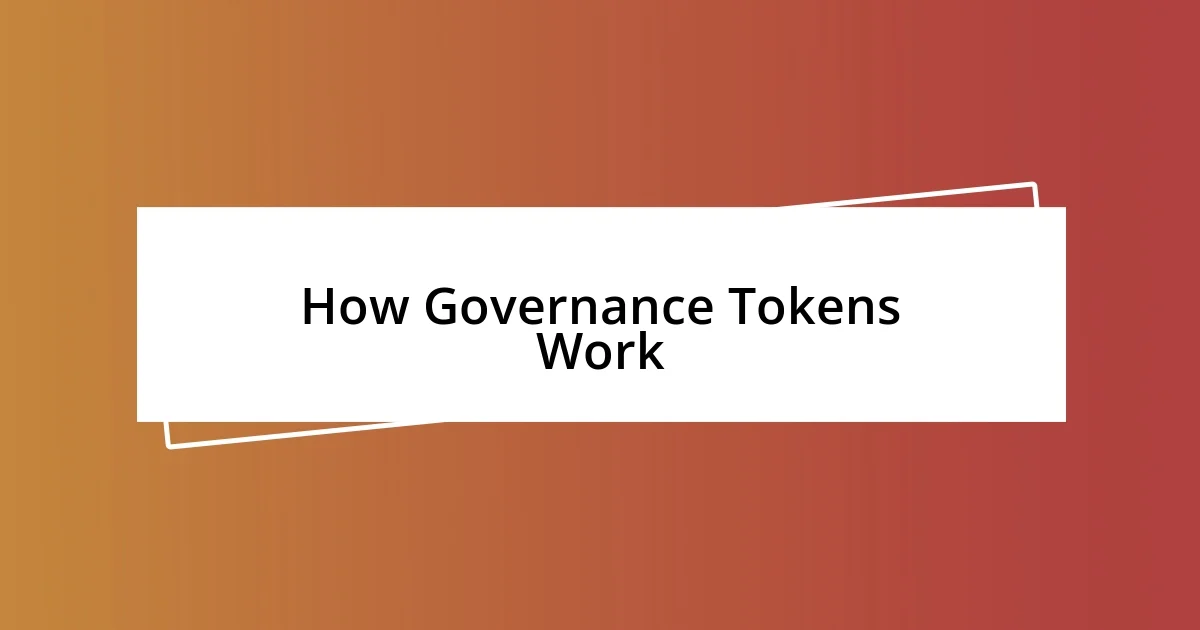
How Governance Tokens Work
Governance tokens operate on the principles of decentralization and community engagement. When you hold a governance token, you typically gain the right to vote on important proposals that can affect various aspects of a project. It’s not just about casting a vote; it’s like being handed a steering wheel to guide the direction of something you care about deeply. I vividly remember participating in a vote that determined the allocation of funds for new features in a project I believed in. That feeling of empowerment was unparalleled, knowing I was part of a collective decision-making process.
- Holders can propose changes or improvements to the project.
- Voting power is often proportional to the number of tokens held.
- Decisions are made through community consensus, enhancing transparency.
- Token holders can influence development priorities and resource allocation.
Engaging with governance tokens has shown me how much more meaningful involvement can be when you have a say in the project’s decisions. In one memorable instance, my vote on a critical governance proposal actually swayed the outcome. It was a surreal experience to realize how a single voice—mine—could play a role in shaping the community’s roadmap. Tokens essentially become a bridge for optimism and collaboration among participants, creating a shared sense of purpose and direction. It’s a tangible reminder that in this ecosystem, we’re all in it together, driving towards a common goal.
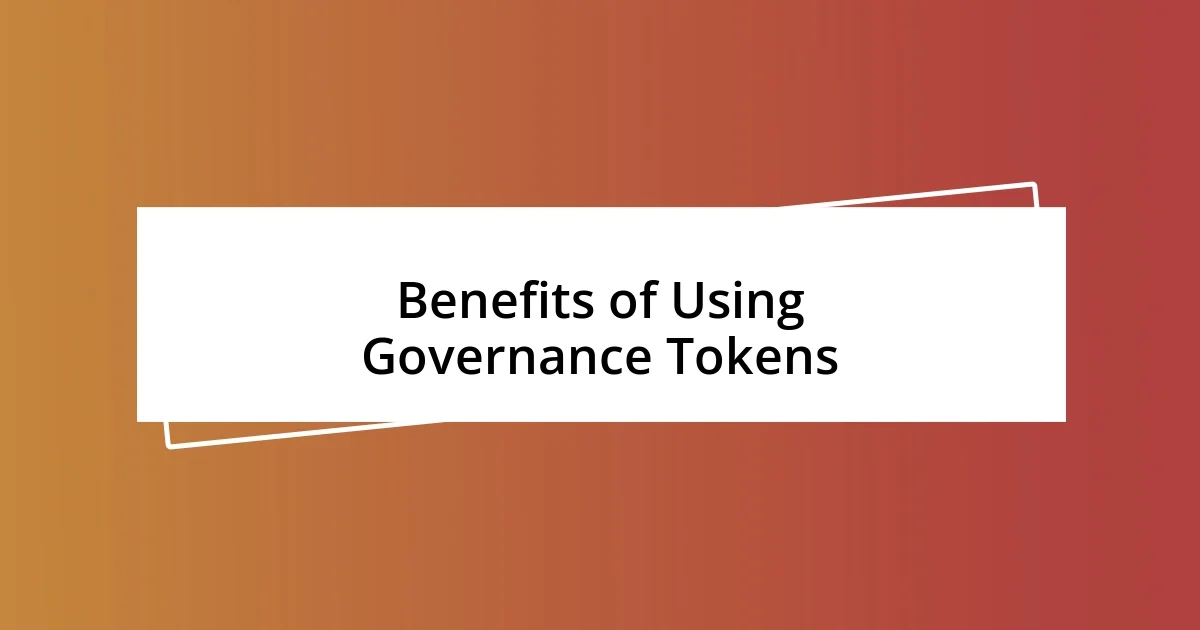
Benefits of Using Governance Tokens
Governance tokens offer a unique opportunity to actively participate in decision-making processes. I remember feeling a rush of excitement when I cast my first vote on a major proposal. The realization that my opinion could steer a project in a new direction was not only empowering but also a reminder of the potential impact we all have in a decentralized community. Isn’t it fulfilling to think that each token can represent a voice in shaping our shared future?
Moreover, these tokens enhance community trust and accountability. In traditional systems, it often feels like the decision-makers are distanced from the very stakeholders they represent. When I shifted my focus to governance tokens, I found that transparency surged. Decisions are up for discussion, and anyone can chime in. I can’t help but feel more connected when I know that what I vote for is visible to all. Don’t you think it’s much easier to believe in a project when you know the people behind it are just as committed as you are?
Another significant benefit is fostering a stronger sense of community. Engaging with others who share similar interests transforms the experience from one of mere investment into a collaborative journey. I recall a vibrant discussion with fellow token holders about a proposed change that could alter the project’s trajectory. The passion and diverse perspectives were invigorating! It’s moments like these that remind me: governance tokens aren’t just about ownership; they’re about creating a dynamic ecosystem where every member can contribute and feel valued. Isn’t that a beautiful vision for the future?
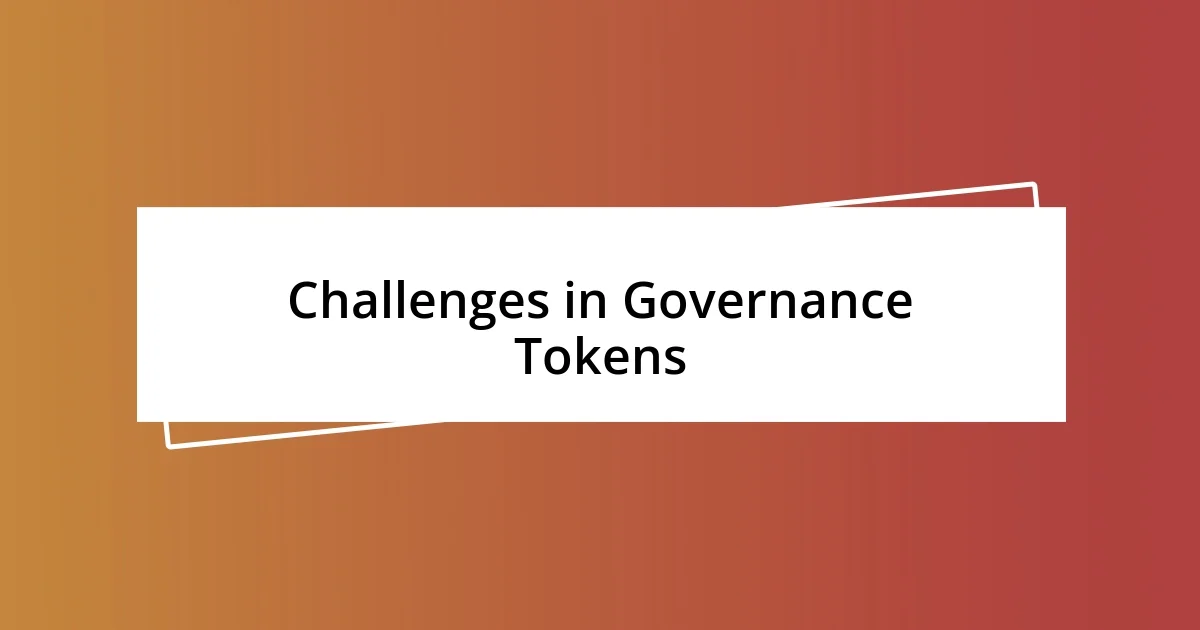
Challenges in Governance Tokens
One of the primary challenges I’ve encountered with governance tokens is the risk of centralization. It’s disheartening to see that often, a small number of holders can amass a substantial amount of influence. I once watched a project where a handful of large token holders dominated the voting process, making it feel like the rest of us were shouting into a void. Isn’t it frustrating when your enthusiasm for participation is overshadowed by the weight of disproportionate power?
Another issue stems from the complexity of proposals. As I’ve navigated various governance platforms, I’ve faced proposals riddled with technical jargon and convoluted explanations. It can be daunting, to say the least! I remember reading a particularly intricate proposal and feeling overwhelmed. It left me wondering: are these governance systems truly accessible to the average token holder, or are they designed for an elite few who can decipher the nuances?
Additionally, voter apathy poses a significant hurdle. Even in situations where most holders have the opportunity to participate, many choose not to. I’ve seen vibrant discussions fizzle out, often due to a waning interest or lack of awareness about the proposal at hand. It makes me ponder, how do we spark a deeper engagement among community members to ensure their voices are heard?
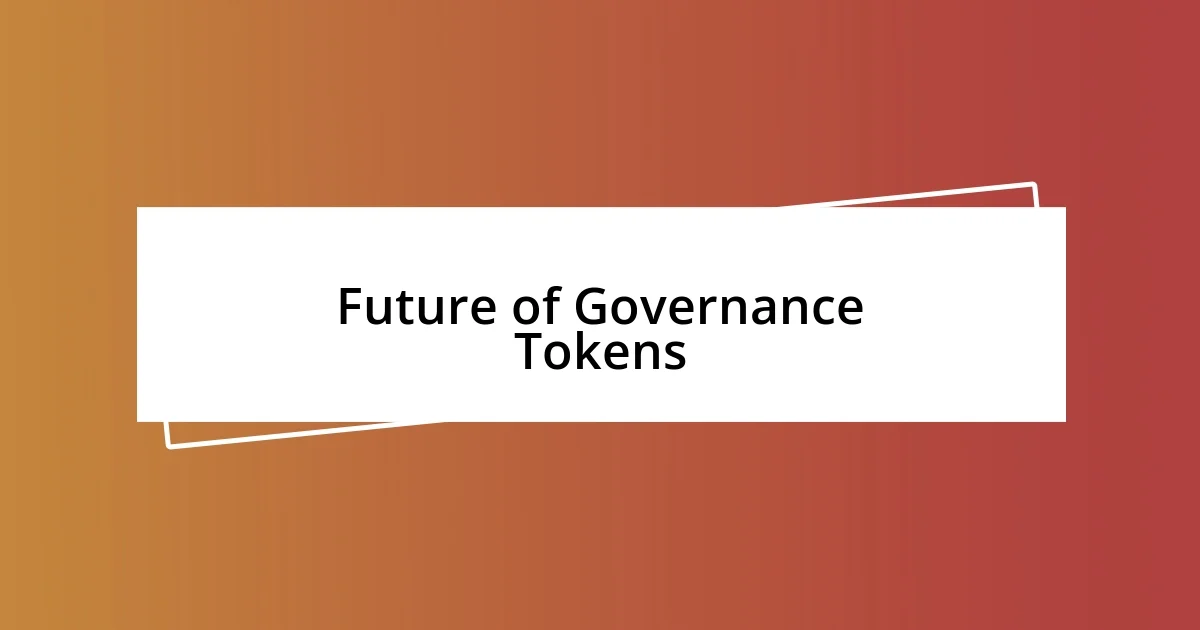
Future of Governance Tokens
The future of governance tokens is undeniably exciting, but it also invites some critical reflections. As I observe the evolving landscape, I can’t help but think about how these tokens might transform the way we engage with projects. Imagine a world where every voice—regardless of the number of tokens held—carries equal weight. What if governance structures evolved to embrace this ideal, allowing us to co-create in a truly democratic manner? That’s a future I find myself longing for.
As these tokens gain traction, their integration within larger DeFi (Decentralized Finance) ecosystems seems inevitable. I recall a moment watching a live-streamed discussion among developers contemplating cross-platform governance models. It struck me how essential it is for projects to interconnect, enabling seamless resource sharing and decision-making. With the right frameworks in place, governance tokens could bridge gaps between different communities, making collaboration not just a possibility but a thriving reality.
However, I can’t shake off a sense of caution, especially regarding the regulatory landscape. When I think about how governments might react to the rise of governance tokens, I wonder: could we face restrictions that stifle innovation? The prospect of navigating compliance hurdles poses a significant challenge, but perhaps it could also pave the way for clearer standards that protect all participants. Balancing creativity and regulation will be pivotal in determining how governance tokens shape our shared digital future.
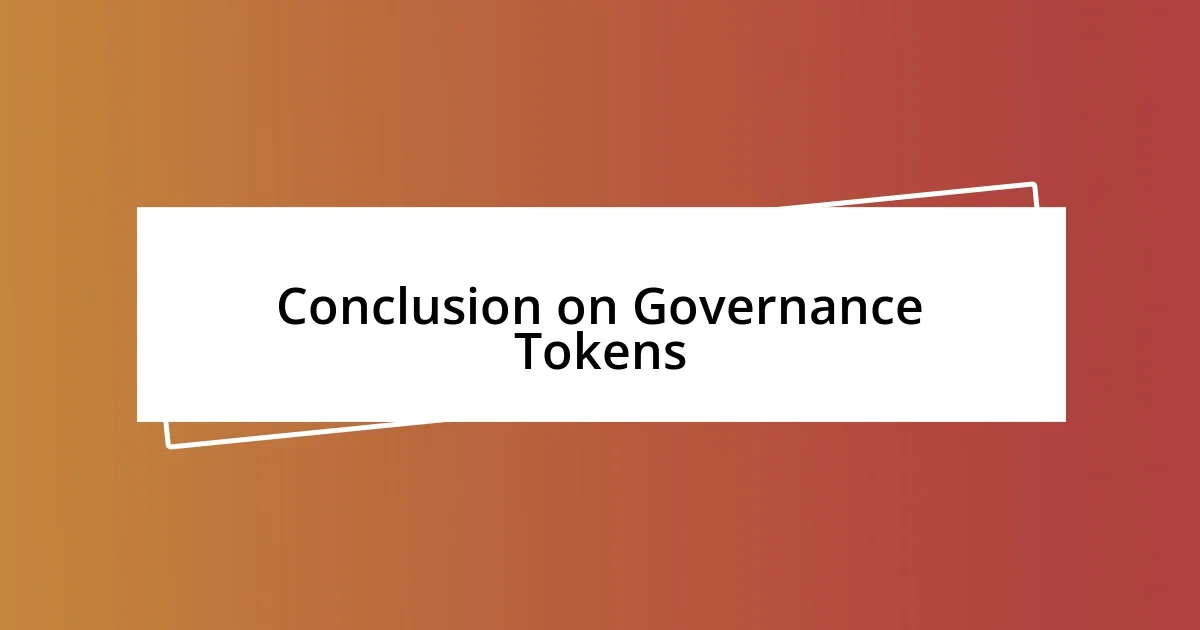
Conclusion on Governance Tokens
Governance tokens represent a fascinating evolution in how communities interact with projects, but my experience tells me we’ve only scratched the surface. When I think back to the moments I’ve engaged in decision-making processes, it sometimes felt exhilarating, yet equally disappointing. Why can’t we strike a balance where effective participation feels empowering rather than intimidating?
Reflecting on the future potential of these tokens, I find myself excited yet cautious. I remember attending a governance meeting where various stakeholders passionately debated a direction for the project. It left me wondering, how can we enhance this sense of collective ownership? If governance tokens can truly facilitate wider engagement, we need to streamline access and simplify proposals. Otherwise, we risk alienating our most enthusiastic contributors.
Ultimately, while the promise of governance tokens shines brightly, I believe their real strength lies in our ability to adapt and prioritize inclusivity. Can we envision a governance landscape where every voice matters, regardless of token wealth? As I continue to journey through this space, I hope we collectively forge pathways that elevate participation, keeping the spirit of community at the forefront.
